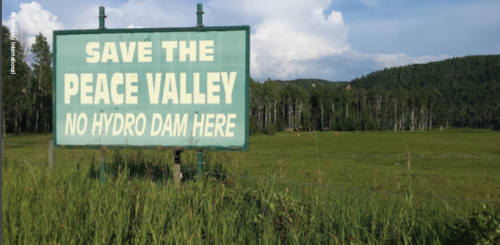Organizations call for suspension of Site C dam; new website launches to monitor court challenge
“The fundamental issue is First Nations in the region have entrenched constitutional rights… to practice hunting and fishing as before, and that’s going to be violated by this dam.” – John Horgan, May 8, 2014
“People shouldn’t have to go to court to claim their rights.” – federal Minister of Crown-Indigenous Relations Carolyn Bennett, speaking at the UN Permanent Forum on Indigenous Issues, April 2018
The federal and provincial cabinets must support an immediate halt to the destructive Site C Dam while the crucial and still unresolved Treaty rights challenge is before the courts. Canada and BC must also act in good faith during this court case in a way that is in line with their commitments to the Truth and Reconciliation Commission’s Calls to Action and the UN Declaration on the Rights of Indigenous Peoples.
OPEN LETTER TO THE GOVERNMENT OF CANADA AND THE PROVINCE OF BRITISH COLUMBIA
Canada’s Treaties with Indigenous peoples are solemn, legal commitments. The duty to uphold Treaty rights is entrenched in the Canadian Constitution and recognized in international human rights standards such as the UN Declaration on the Rights of Indigenous Peoples. Canada’s claim to be a just society requires that Treaty rights be honoured and not pushed aside when they are politically inconvenient.
It is beyond dispute that flooding the Peace River Valley will be profoundly harmful to First Nations. The federal-provincial impact assessment found that the harm to First Nations’ use of the land would be severe, permanent, and irreversible.
The fundamental question of whether building the Site C Dam is compatible with Canada’s Treaty obligations should have been addressed before the dam was ever approved. That never happened, as Premier Horgan himself publicly acknowledged in October 2017.
Instead, the governments of Stephen Harper and Christy Clark acted dishonourably and set up the decision-making process to deliberately exclude consideration of their governments’ legal obligations under Treaty 8. When First Nations objected that the dam would violate the Treaty protection of their cultures and way of life, the federal and provincial governments challenged them to prove it in court.
Refusing to respect already established rights unless First Nations undertake drawn-out and extraordinarily expensive legal challenges is profoundly unjust. The ability of governments to simply ignore their Treaty responsibilities clearly rests on a basis of racism, discrimination and indifference to the rights and well-being of Indigenous peoples. It is hard to imagine any other Constitutionally-protected right being so casually pushed aside.
Pause construction while courts deliberate
The legal challenge launched by the West Moberly and Prophet River First Nations means that a BC court will soon consider the very questions that the federal and provincial governments ignored: does the flooding of the Peace River Valley violate the Treaty promise and can that violation be justified?
Since the federal and provincial governments have chosen the courts as the venue for Site C’s impacts on Treaty rights to finally be addressed, there is a very high onus on these governments to allow the court the opportunity to reach a just, fair, and timely conclusion. West Moberly has asked the court for an injunction to either halt construction entirely, or at least preserve the most ecologically and culturally sensitive areas of the Valley, so that the court has the opportunity to reach a meaningful resolution of the case. Our organizations are calling on the federal and provincial governments to support this request.
The 2017 BC Utilities Commission Review of Site C demonstrates that there is no economic necessity to rush ahead with construction. Even the BC government’s explanation for why it decided to continue construction – that rather than paying the immediate costs of shutting the project down entirely and remediating the land, it would rather push the much higher costs of completing Site C off to the future – does not preclude a temporary halt to the project while it is before the courts.
The First Nations challenge to Site C could likely succeed. It would be a travesty of justice for the courts to eventually rule that Canada and BC are obligated to protect the Peace River Valley – only after the Valley has already been destroyed.
Respect, accountability, and transparency needed in court
Our organizations are also calling on the federal and provincial governments to ensure that the arguments and tactics that they use in this court case are consistent with their public commitments to uphold the rights of Indigenous peoples and implement both the Truth and Reconciliation Commission’s Calls to Action and the UN Declaration.
Far too often, governments make lofty promises about Indigenous rights in public while working to undermine those rights in the obscurity of the courtroom. That’s why our organizations have launched a new website – www.witnessforthepeace.ca — to monitor and expose government actions before the courts in this crucial test case for the recognition and protection of Indigenous rights.
We believe that this initiative embodies the fundamental principle that we all have a responsibility to ensure Canada’s commitments to Indigenous peoples are honoured and upheld. As a consequence, we are encouraging all members of the public – regardless of their views of Site C itself – to join us in following this case and holding governments accountable to a common vision of reconciliation and respect for rights.
– Witnessforthepeace.ca, May 7, 2018
This Open Letter was signed by the following organizations:
Amnesty International Canada
Union of BC Indian Chiefs
BC Yukon KAIROS
Fight C
Peace Valley Solidarity Initiative
Rolling Justice Bus
Yellowstone to Yukon Conservation Initiative
Media Contact:
Jacob Kuehn, Media Relations, Amnesty International Canada. jkuehn@amnesty.ca/ 613744-7667 x 236.






















